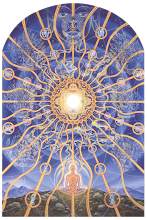martin heidegger suggests that anxiety is useful in that it shocks you out of your life as a man in a crowd (das mann) with the reality that no one is going to die for you so we should focus on the essence of our being, enabling us to live an authentic life.
to me, anxiety and insecurity draw attention to what exists in our lives and is not acceptable in metaphysical nature, where pain plays the same role in the material world. at first, anxiety nudges at our side for us to open up and adjust our attitude to alleviate the suffering. but the ego tells us to repress these feelings because the ego is blind to positive and negative energy. but the feeling doesn't go away, anxiety consume the person's life and causes every irrational and perhaps every inappropriate action.
with advanced pineal gland meditation, i have developed a keen sense to identify the anxiety and insecurity in a person. i have seen it plague the entire body and cripple the happiness and beauty in a person. my sensitivity to this phenomena becomes tangibly futile since it is the anxiety that becomes inflamed with the notion of being exposed so out of respect for the person's well being i am obliged to let it go even when i feels like i'm turning my cheek to an injustice.
Tuesday, February 16, 2010
Subscribe to:
Post Comments (Atom)

This idea of Martin Heidegger's, that anxiety causes one to think about the essence of life, seems to suggest that efforts toward safety both stem from thinking about the essence of life, and that such efforts aim in part to eliminate thinking about the essence of life. I find this train of thought very interesting, and it leads me to a number of questions. First of all, does life have an essence? I would bet not, unless one were to reduce life to its concept, in which case the concept of life is its essence. However, one could still entertain the idea that anxiety causes one to think about life in general, as well as the idea that efforts for safety aim to eliminate thoughts about life in general. If this were the case, then danger, that is, threats to human life, would be extremely important to the value of life itself. This leads me to my next questions: Should one value danger? Should one value safety? Should one value thinking about life? Should one value life if one doesn't think about it?
ReplyDeleteI am thinking now about the fact that ancient philosophers began to be able to engage in philosophy once they were comfortable enough in their lifestyles to have leisure time. So, maybe safety is somehow conducive to thoughts about life. Also, maybe a certain degree of anxiety persisted so that such philosophers were not comfortable to the point of doing away with thought. Do the best conditions for thought require some sort of balance between danger and safety?
ReplyDeletePlease remember: all posts should end with a question.
ReplyDeletein my philosophy, there is 1 essence but the material form is infinite, as long as something happens and change exists, there is time. everything that can be experienced is a part of this essence, it is the metaphysical dimension that which everything comes out of. as i say in one of my previous posts, every action first exists as a possibility and the world of possibility is just a slice of that metaphysical dimension (god if you will).
ReplyDeleteyou (nickolas) propose a strong logical argument (however logic cannot be used to prove metaphysics, it is the nature of the beast). to move forward in this argument we first must suppose that life IS worth preserving. i am not fully convinced, if we set aside our ego, we realize that the end of our life is not the end of life, and that what we have constructed or shared with others will be remembered after our death and in many cases enhanced (in the sense that people remember your life once it is complete more so than when it in in progress) by our death. anxiety, emerging from the ego, will cause us only to think about OUR life in general. and even when we feel anxiety about someone else dieing it is because we see how the person's death will impact us. it is a feeling, a reaction to non-actualized stimuli, which is the basis for anxiety being inappropriate at any degree.
maslow's hierarchy, though flawed certainly makes a valid point about how we prioritize our needs. danger is extremely valuable (from my blog about wisdom vs knowledge) but not in itself, but for the lesson it teaches about life. to seek safety is to seek laziness, but to be safe gives us the freedom to choose in what direction and to what degree we want to take risks, that is the value of safety and the answer to your question about the balance of danger and safety. self reflection is the only way to value life, only then do you know what you have to lose and gain in continuing to live.
professor johnson, i will adhere, but because all my blogs are my personal philosophy every sentence is in question...